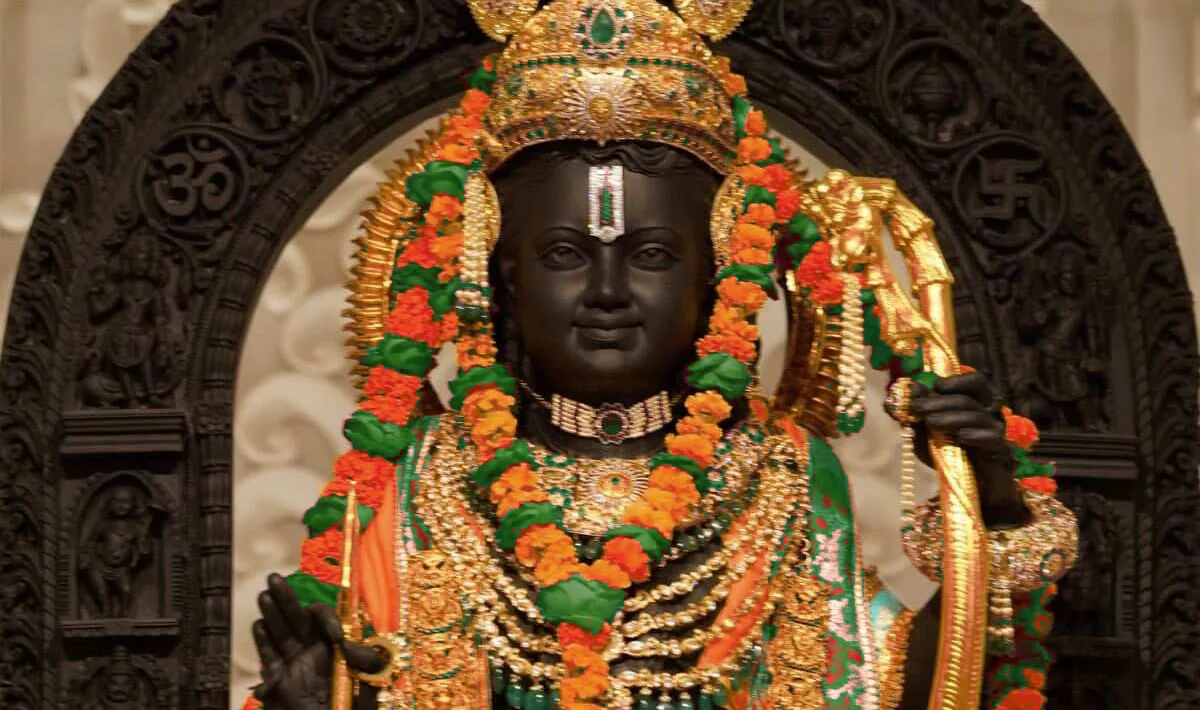Apara Ekadashi is one of the most auspicious days according to Hindu philosophy of religion. Also known as Achla Ekadashi, it is celebrated in the honour of divine Sri Hari or Vishnu. As per Hindu Calendar, Apara Ekadashi is celebrated on the 11th day of Jyeshta month, during Shukla paksha. According to the Gregorian calendar, it falls in the month of June or May. Ekadashi is the most important vrat observed in honour of Krishna Bhagawan.
Apara Ekadashi
Hindu calendar is divided into two cycles of moon viz. waxing phase known as Shukla paksha, and waning phase known as Krishna paksha. Ekadashi falls on the eleventh day of each phase. Thus, every month has 2 Ekadashi’s. Apara Ekadashi is the Ekadashi of Shukla Paksha, in the month of Jyeshta. Apara is a Sanskrit word which means limitless; the observer of this vrat is blessed with unlimited blessings. It is said that observing fast on this day, washes away all the sins and curses, with the divine infinite blessings of Shri Vishnu. One should break the fast (Parana) before the end of Dwadashi tithi, and not during Hari Visara (fourth duration of Dwadashi). In Punjab, Apara Ekadashi is named as Bhadrakali Ekadashi, and Devi Bhadrakali is worshipped on this day. In Odisha, it is called Jalakrida Ekadashi, celebrated in honour of Bhagawan Jagannath.
ORIGIN AND SIGNIFICANCE:
The Brahmanda Purana mentions the significance of Apara Ekadashi as a gateway to moksha. Shri Krishna explains to Dharmaraj Yudhishthira, that anyone who observes Apara Ekadashi vrat with proper rituals, would be freed from all curses and can attain moksha.
Lord Krishna says “the merits of observing vrat on Apara Ekadashi are limitless. The one who observes this fast, is redeemed from the grieves of the sins such as Brahmahatya, gou-hatya, embryo killing and infanticide. It also releases one from sins like blasphemy and adultery. It is effective even for people who cheat, rob, write false scriptures, commit forgery, or fake as an astrologer or doctor. Just by observing Apara Ekadashi vrat, such people are relieved from all their sins and their consequences. Those who fail to perform from their duties are known to go to hell. Kshatriyas who flee from the battlefield are believed to suffer in hell. Even such people are freed from sinful actions and attain a place in heaven, by observing Apara Ekadashi vrat. Most importantly, a failed disciple, who even after receiving proper spiritual education from is Master, blasphemes and walks in the path of unrighteousness, is bound to receive unlimited sufferings, but he also can redeem himself by observing this vrat with complete dedication and intention to walk on the right path. The benefits of observing this vrat is equal to the merits that one gets by bathing three times in pushkara kshetra, bathing at a time of solar eclipse in Kurukshetra, bathing at Prayag during the month of Magh, offering prayers to Shiva during Shivaratri, performing pitru puja and donating cows, gold and silver. This Ekadashi is like a forest fire that burns down the forest of sinful deeds that one creates; it is like sun’s bright light that eradicates all darkness and like an axe that cuts down all the trees of wrong deeds that one sows; thus, completely relieving one from all the sins. One who worships the Supreme personality of Godhead on this day, indulges in chanting the holy names and observing vrat, is freed from all sins and secures a place in the holy abode of Vishnu ”.
DIETIES ASSOCIATED WTH THE FESTIVAL:
Apara Ekadashi, like any other Ekadashi, is dedicated to the worship of Sri Hari or Bhagawan Vishnu.
CUSTOMS, TRADITIONS AND RITUALS:
Ekadashi is considered an important day as per Hindu traditions. Apara Ekadashi, has a special significance because it is considered as one of the strongest pathways to moksha, as preached by Bhagawan Krishna himself. The day starts with an early bath, followed by chanting of the mantra “Ganga Cha Yamuna Chaiva Godavari Saraswati, Narmada Sindhu Kaveri Jalsemin Sannidhim Kuru”. Devotees observe a fast and consume only fruits, milk or curd on this day. The fast is broken the next day, Dwadashi tithi, before the fourth duration of Dwadashi. Donations of gold, silver, clothes and food are considered very beneficial on this day. People also organize hawans and recite Vishnu Shastranaam. Some important customs to be followed on this day are:
- One should wear a ten mukhi rudraksha or nineteen mukhi rudraksha, to meet devotional aspirations.
- Rice, Beans and grains are strictly prohibited, one can consume sabudana khichdi, fruits, milk, curd.
- Killing any animal is considered to be the greatest sin on this day.
- One should not indulge in gambling, alcohol consumption etc.
- One should not sleep during the day of Ekadashi.
- One should do Parana on the next day of Ekadashi in one’s own home, should not eat on bell metal or cutlery and should not apply oil on the body.
- An unfriendly belief is that if one speaks to a person from lower caste on that day, he has to purify himself by eating Tulsi/Amalka leaves.
- If one is not able to break the fast on the next day owing to some reason, then, he can break it having water and later can have food.
- Chant Om Namo Bhagavate Vasudevaya Namah as many times as possible.
PUJA VIDHI AND KATHA:
Vidhi:
- Add a few drops of Ganga Jal to bathing water, and take a bath in Brahma muhurta. Chant the mantra “Ganga Cha Yamuna Chaiva Godavari Saraswati, Narmada Sindhu Kaveri Jalsemin Sannidhim Kuru”. This chant means “I invoke the presence of the holy rivers of Ganga, Yamuna, Godavari, Saraswati, Narmada, Kaveri and Sindhu, in this water, so I can receive the blessings of the Holy Rivers”.
- Chant “O Asvakrante, O Rathakrante, O Vishnukrante, O Vasundhare, O Mrittike ” during This mantra means, “O Mother Earth, please remove all my sins from past and present lives so that I may enter the holy abode of Vishnu”
- Ignite ghee or mustard oil jyoti in the worship room.
- Clean the chowki and spread a red cloth over it.
- Place the murti of Shri Hari on the chowki and dress Vishnuji in yellow clothes.
- Chant the Vishnu Moola mantra “Om Namo Bhagvate Vasudevay Namah”.
- Offer water, flowers, tulsi, natural perfume, dhoop, incense and naivedya prepared at home. It can be anything like Halwa or kheer or even fruits.
- Offer Tamboolam consisting of paan, supari, coconut, chandan, turmeric, akshat and Dakshina.
- Read the katha for this day.
- Perform 1000 recitations of Vishnu sahasranamam.
- Donate clothing, food, gold and silver to Brahmins.
- In the evening, offer fresh flowers, fruits, dhoop, incense, ghee jyoti and bhog prasad.
- Perform the aarti and distribute prasad.
- Break the fast on the next day (Dwadashi) only.
Katha:
Centuries ago, there lived a king named Mahidhwaj, who was very gentle in behaviour. On the other hand, his brother, Bharajdhwaj, was very cruel and indulged in bad deeds, throughout his life. Bharajdwaj always disliked Mahidhwaj, and one night, he killed him and buried him under a peepal tree. Once, a sage named Dhumya happened to cross the tree, and learned about Bharjdhwaj’s evil deeds. He advised Bharajdhwaj to correct himself and relieve from all of his wrong deeds, lest he see a fall. Bharjdhwaj regretted his sins, and sought guidance from the sage for getting relieved from his sins. Sage Dhumya advised him to perform the Apara Ekadashi vrat, that would release him from his sinful actions and ultimately guide him on the path of Moksha.
CELEBRATIONS ACROSS THE COUNTRY:
Apara Ekadashi is observed in Jyeshta month during Shukla paksha. Of all the Ekadashis observed in a year, Apara Ekadashi is considered to be the most popular one. In Madhya Pradesh, people celebrate this Ekadashi with great devotion and commitment. people in great numbers, visit temples to seek blessings and reserve a place in Heaven after death. The festival goes by several names across the nation, such as Achala Ekadashi, Jalkrida Ekadashi, Bhadrakali Ekadashi, Vaishakh Vadi Ekadashi.
BENEFITS OF APARA EKADASHI:
Apara Ekadashi is believed to be the diminisher of all sins and merits one with good deeds. One who observes fast with rituals and procedure on this day, is blessed with admiration, honour, peace and respect and finally attains salvation.



